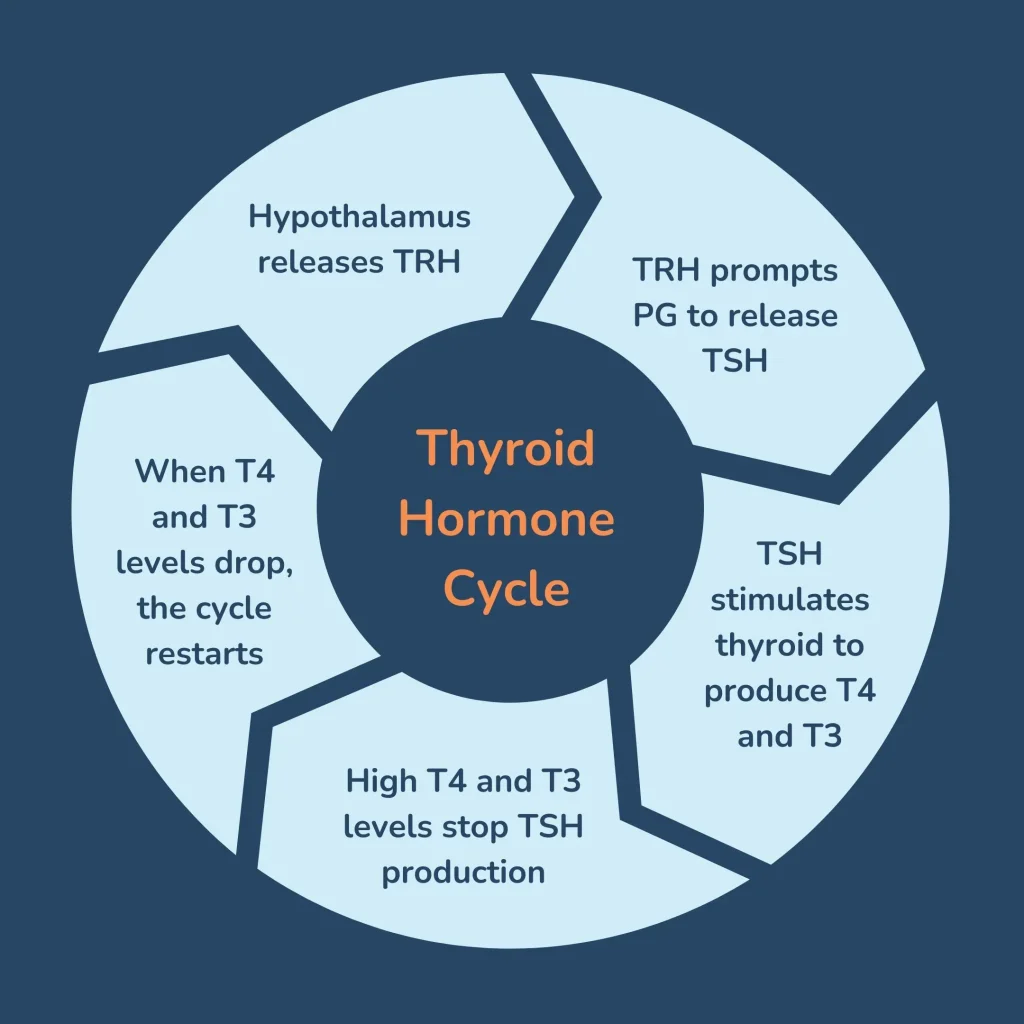Research suggests that a postprandial (after-eating) state can affect TSH levels. It tends to lower TSH levels, which can pose serious implications for hypothyroidism condition.
Table of Contents
ToggleWhen You Should Get a Thyroid Test?
If you have a family history of thyroid disorders, you should consult your doctor to rule out potential risks. A study examining the influences of age, gender, smoking, and family history found that:

If you are experiencing these signs, it’s better to consult a healthcare provider as soon as possible. This is important because thyroid symptoms can sometimes be mistaken for normal signs of aging in older adults.
- Unexplained changes in weight
- Feeling tired or lacking energy
- Pain or weakness in the joints or muscles
- Difficulty tolerating heat or cold
- Hair becoming thinner or falling out
- Feelings of sadness or depression
- Feeling nervous, anxious, or easily irritated
- Swelling or enlargement in the neck, known as a goiter
What Should You Avoid Before Thyroid Blood Test?
- You should avoid consuming iodine-rich foods, such as kelp, seafood, and iodized salt, before the test. This is because iodine can affect hormone levels and disrupt the accuracy of the results. Additionally, if the test involves the use of radioactive iodine, you may be instructed to avoid iodine-rich foods to ensure precise and reliable outcomes.
- It’s recommended to avoid taking thyroid medications at least 12 hours before the test and take your morning dose after the test.
- You should also stop taking biotin (vitamin B7) supplements at least a week before the test. Biotin is used in some thyroid testing methods, and having too much in your system can confuse the results by making your hormone levels look different than they actually are.
What are Other Ways a Thyroid Can Be Tested?
Apart from blood tests, there are other ways to check your thyroid:
- Thyroid Ultrasound: This uses sound waves to create pictures of your thyroid and checks for lumps, nodules, or other issues.
- Radioactive Iodine Uptake (RAIU) Test: This measures how much iodine your thyroid absorbs, which can show if it’s working too much or too little.
- Thyroid Scan: A small amount of radioactive material creates an image of your thyroid to show its size, shape, and activity.
- Fine-Needle Aspiration (FNA) Biopsy: If there’s a lump or nodule, a small tissue sample is taken to check for cancer or other concerns.
These tests are usually done if blood tests show something unusual or if there are signs of thyroid problems that need more investigation.
Cost of Blood Test in Ontario Without OHIP:
Thyroid tests are generally covered by OHIP if they are deemed medically necessary. This includes tests like TSH (thyroid-stimulating hormone), Free T4, and Free T3, which are commonly used to diagnose or monitor thyroid conditions such as hypothyroidism or hyperthyroidism.
For the test to be covered, it must be ordered by a licensed healthcare provider, such as a doctor, or a nurse practitioner. If you’re unsure about coverage or whether the test is necessary, consult with your healthcare provider beforehand.
This is the cost without insurance for thyroid blood tests.
- Free T3: $20 – $30
- Free T4: $20 – $30
- Reverse T3 (RT3): $40 – $70
- Thyroid-stimulating hormone (TSH): $20 – $30
What does a Thyroid Blood Test Show?
A thyroid blood test measures the hormone levels of TSH, T3, and T4. Lower concentration will indicate the possibility of hypothyroidism and vice versa.
Here is a simple breakdown.
TSH: Thyroid-stimulating hormone, released by the pituitary gland, controls the levels of T3 and T4 hormones. Doctors usually recommend testing this hormone first. The standard range is generally 0.5–5 mU/L, but it can vary based on factors such as age, gender, and life stage.
In older adults, its ranges are:
- 65–70 years: 0.65–5.51 mIU/L
- 71–80 years: 0.85–5.89 mIU/L
- > 80 years: 0.78–6.70 mIU/L
T3: A T3 test checks the level of triiodothyronine, a thyroid hormone that helps regulate your metabolism. Doctors often use this test to diagnose hyperthyroidism, especially if T4 levels are already high.
T4: A T4 test measures the amount of thyroxine in your blood. Too much or too little T4 can be a sign of a thyroid problem, like hypothyroidism or hyperthyroidism.
Thyroid Hormone Cycle:
This infographic will help you understand how the thyroid hormone cycle works.

How We Can Help?
We completely understand the challenges that come with aging. Sometimes, a little help is all you need to stay on track. Whether it’s assistance with daily tasks, companionship, or professional nursing care, our in-home support ensures you can live the way you want.
Reach out for a free assessment today!
Final Thoughts:
The thyroid gland helps control your body’s metabolism, growth, and energy. To get accurate thyroid test results, it’s important to keep things consistent, like the time of day you test or whether you’ve eaten. Fasting usually isn’t required, but it’s always a good idea to talk to your doctor about any questions or concerns. Understanding your thyroid health through tests or other methods can help in diagnosing and managing conditions like hypothyroidism or hyperthyroidism.
FAQ’s
1. Which Blood Tests Usually Require Fasting?
Some blood tests require fasting to ensure accurate results. Common examples include:
- Blood Glucose Tests: These assess the sugar levels in your blood, often used to diagnose or monitor diabetes.
- Cholesterol or Lipid Panel Tests: These measure various types of cholesterol and triglycerides in your blood.
- Basic Metabolic Panel (BMP): This evaluates your overall metabolism, including kidney function, electrolytes, and blood sugar.
2. Can I Take Thyroid Hormone on an Empty Stomach?
Yes, thyroid medication is best taken on an empty stomach. It’s recommended to take it at the same time each day, typically in the morning right after waking up. After taking the medication, wait 30–60 minutes before eating or drinking anything, including coffee or milk.
3. What Is the Life Expectancy of a Person With Hyperthyroidism?
With proper treatment, individuals with hyperthyroidism can live a normal lifespan. Early diagnosis and consistent management of the condition are crucial in preventing complications such as heart problems or brittle bones.
4. Can I Get a Thyroid Test Without a Doctor?
Yes, at-home thyroid test kits are available and do not require a prescription. These kits test the same hormones included in a standard thyroid panel. To use them, you typically prick your finger to collect a small blood sample, which is then applied to a testing card or sent to a lab for analysis.
5. Does thyroid disease shorten life expectancy?
No, thyroid diseases like hypothyroidism or hyperthyroidism usually don’t shorten life expectancy if treated properly. However, leaving these conditions untreated can lead to complications, like heart problems, that might affect your overall health.
6. Can hyperthyroidism cause sudden death?
It’s very rare but hyperthyroidism can lead to a serious condition called thyroid storm. In 8-25% of people, it can be fatal as it causes sudden heart issues, brain and spinal cord dysfunction, rapid heartbeat high fever, etc.
7. What is the best time for a thyroid test?
Morning is the best time for thyroid tests, ideally between 8:00 AM and 10:00 AM. That’s when your hormone levels are most stable, giving the most accurate results.

Fakiha is an experienced writer at ConsidraCare with an optimistic interest in life. She has a proactive approach to improving health and wellness for seniors. She offers well-researched and thoughtful information to help individuals make informed healthcare decisions for themselves and their loved ones.



